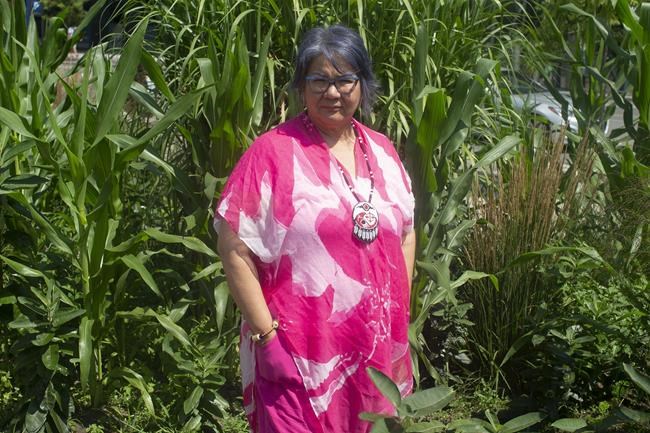Assembly of First Nations chief says keeping flags lowered honours children who died
Advertisement
Read this article for free:
or
Already have an account? Log in here »
To continue reading, please subscribe:
Monthly Digital Subscription
$0 for the first 4 weeks*
- Enjoy unlimited reading on winnipegfreepress.com
- Read the E-Edition, our digital replica newspaper
- Access News Break, our award-winning app
- Play interactive puzzles
*No charge for 4 weeks then price increases to the regular rate of $19.00 plus GST every four weeks. Offer available to new and qualified returning subscribers only. Cancel any time.
Monthly Digital Subscription
$4.75/week*
- Enjoy unlimited reading on winnipegfreepress.com
- Read the E-Edition, our digital replica newspaper
- Access News Break, our award-winning app
- Play interactive puzzles
*Billed as $19 plus GST every four weeks. Cancel any time.
To continue reading, please subscribe:
Add Free Press access to your Brandon Sun subscription for only an additional
$1 for the first 4 weeks*
*Your next subscription payment will increase by $1.00 and you will be charged $16.99 plus GST for four weeks. After four weeks, your payment will increase to $23.99 plus GST every four weeks.
Read unlimited articles for free today:
or
Already have an account? Log in here »
Hey there, time traveller!
This article was published 31/08/2021 (1525 days ago), so information in it may no longer be current.
OTTAWA – Assembly of First Nations National Chief RoseAnne Archibald says leaving Canadian flags lowered continues to honour the lives of Indigenous children who died at residential schools.
Liberal Leader Justin Trudeau ordered the flags lowered in May, following the first discovery of unmarked graves on the grounds of former residential schools. Hundreds more have been found since and dozens of additional ground-penetrating radar projects are underway.
The Truth and Reconciliation Report dedicate an entire volume to the thousands of children who died in residential schools from disease, neglect, accidents and abuse, noting that poor record-keeping meant hundreds of families still don’t know what happened to their loved ones.

An attempt by the TRC to identify the children who died came up with 3,200 names, but TRC Chair Murray Sinclair has said the actual number is likely more than twice that.
Last week, Conservative Leader Erin O’Toole said it was time to raise the flag back up and be proud of it at the same time as Canada continues to work on reconciliation efforts with Indigenous people.
When asked what she thinks of his comments, Archibald said if the flags were kept lowered for a day for every child discovered so far, they would stay at half-mast for between 11 and 17 years.
“I think that the longer that the flags remain at half-mast really honours these children, honours our little ones, honours our families, honours our communities,” she said.
Archibald was speaking at a news conference Tuesday to unveil the AFN’s priorities for this election. She said she wasn’t going to be partisan or endorse any candidates because she has to work with whichever party forms the next government.
The issue of identifying all the children buried in unmarked graves is the AFN’s first priority, said Archibald.
“The revelation of the unmarked grave sites of our little ones across this country has heightened the awareness of Canadians regarding the genocide that occurred and the healing that needs to be done,” she said. “We will be calling for strong action on this issue as part of the healing path forward.”
That includes a healing foundation for residential school survivors and those affected by the intergenerational trauma they caused.
Urgent action on climate change, respecting First Nations sovereignty and jurisdiction and First Nations economic prosperity are also on her list.
“The economic impacts of the pandemic were devastating for many First Nations,” she said. “Already we were among the most vulnerable, and were particularly hard hit. The healing path forward means sustained investments are needed to support growth and sustainability.”
Indigenous issues have not been a major part of election discourse from the main parties thus far. NDP Leader Jagmeet Singh visited the Cowessess First Nation in Saskatchewan on Aug. 20, where he repeated his earlier calls for the deaths to be prosecuted criminally.
Trudeau said that same day that it took centuries to break the relationship with Indigenous Peoples and it will take more than a few years to fix, while touting some progress having been made including on clean drinking water.
The Liberals however promised during the 2015 election that they would end all boil water advisories on First Nations by March 2021. An Indigenous Services Canada website says since 2015, 109 drinking water advisories have been lifted, but in that same time frame, 60 new advisories have been issued. There remain 51 advisories in 32 communities.
Archibald said now that the AFN priorities have been made public, the time for parties to respond has come.
“In terms of where we are in this election, we’ve just released our documents,” she said. “So now we’re going to look forward to seeing how the parties respond to that. They haven’t had really an opportunity to look at any document from us up until today. So now we will begin to see where each party stands, and how they will comment and move forward in this election addressing First Nation concerns.”
This report by The Canadian Press was first published Aug. 31, 2021.

















